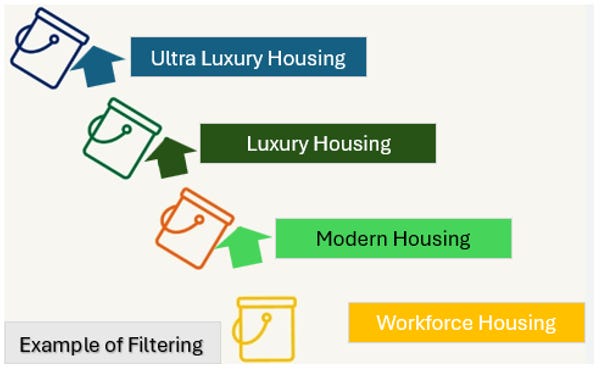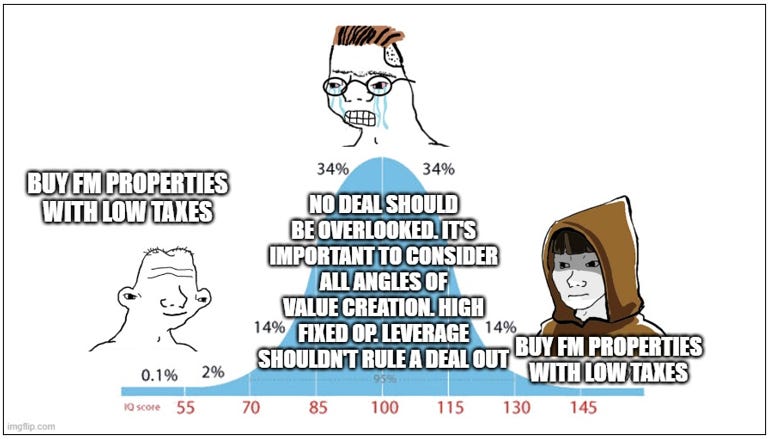In NYC Housing, Simpler is Better
Complicated Solutions Feel Better Than Simple Ones
According to Know Your Meme, a Midwit (like dimwit but smarter) describes someone of middling, or slightly above average intelligence who believe he or she is highly gifted. Midwits are tragic because they are smart enough to grasp concepts, but they fall short of working things out and delivering simple, straightforward solutions. Midwits fall prey to the Dunning-Kruger effect, and they overestimate their abilities. Instead of observing Occam's razor principle that the simplest solution is usually the best one, they seek out complex and convoluted answers that can be prone to errors and lead to poor outcomes.
According to Philo from Substack, this is what a Midwit looks like in traditional investing, in relationship to the genius and the Simpleton:
“In the example above, the genius [right] works out that simple index funds are the best solution for most people because the management fees and trading costs associated with most active investing strategies are very high and end up being the dominant factor in determining returns for most people. The passive investor will generate average returns without incurring any meaningful costs, while active investors considered as a whole must still generate average returns and after that still must contend with high management and trading costs.
The simpleton [left] doesn’t understand any of this but just goes with the default 401(k) index funds and ends up in the same place.
It is only the midwit that believes that all smart people should pursue high-fee active investing strategies, and as a result the midwits (as a whole) are the only ones that underperform.
The genius and the simpleton will both end up with the right answer for very different reasons: the genius will fully understand and correctly solve the problem, while the simpleton will blunder into the right answer for the wrong reasons. (The simpleton always picks the simple answer whether it is right or wrong, an approach that will sometimes lead to the right answer by chance).
It is only the midwit [middle] who manages to get the answer wrong, by coming up with a complicated solution that appears smart and sophisticated but ultimately proves to be incorrect.” – Philo Substack
Where the Simpleton vies for simplicity and ease, the Midwit seeks nuance and complexity and picks solutions to reflect this propensity. This pattern usually occurs without regard for what's correct or incorrect.
What Midwits might look like in solving the affordable housing crisis in NYC:
The Simpleton correctly believes the Economics 101 principle that all else equal, greater supply will quell or significantly slow price increases. The genius understands what the Simpleton knows to be true, but her knowledge also encapsulates second and third-order consequences that follow the slower price increases. For example, the genius understands that a 2x increase in the housing supply would make the housing market more competitive. They recognize that doing so would reduce landlord incentives to replace existing tenants. With greater supply, the yearly increase in new rents in the open market would grow more slowly. That would reduce the spread between in-place rents for tenants and the new rents they would face if they moved somewhere new. Instead of landlords wanting to remove tenants to capture this spread, the paradigm could evolve to one where occupancy is not guaranteed and becomes something to be strived for. That would closely align property owner and tenant incentives to stay in the building. The genius thinks it all the way through. Genius and Simpleton take different paths in their thinking but arrive at the same place.
Midwits, on the other hand, opt for complexity, and they might believe that all new housing developments must contain affordability components to help those in need. In fostering this belief, midwits lose sight of the foundational concept of filtering. No matter what type of housing is built (workforce, luxury, or somewhere in between), new housing units create spaces for families to move into, and this sets off ripple effects across the entire housing stock. When one family moves into the latest development, it leaves behind space for some other family to move into. Over time, the housing stock will age, and the filtering process enables lower-income families to occupy previously higher-income housing. Filtering theory recommends building housing at any income level. Whenever the newly developed properties obtain full occupancy, many units in "less desirable" properties will have opened up.
Besides dismissing the filtering theory, when Midwits advocate for building only affordable units they invite more complexity in development of housing. Structuring the capital stack for tax credit deals is challenging compared to market deals. Sourcing construction loans, equity partners and cooperation from city agencies is difficult. When City Council members ask developers to revise their construction plans, they ask for things that will take meaningful work hours to achieve.
Some City Council members' rebuffs of developer plans bring victories in the short term, like the doubling of affordable housing units in Silverstein Properties' 3,200 units project called Innovations Queens. Other times, City Council interjections inhibit housing, and new housing developments wither and die like Bruce Teitelbaum's One45, 900 apartments built on 145th Street in Harlem, or Bruce Eichner's 962 Franklin Avenue, a 475-unit project in Prospect Lefferts Gardens, to name a few. Regardless of negotiated outcomes, the years of back and forth between city officials and developers when developers seek to build things that are not as-of-right create a strong deterrent effect for capital flows and developer activity. It took Bruce Eichner 7 years since publishing initial construction plans for 960 Franklin Ave before finally cancelling his project plans.
Do City Council members create a net positive effect on the housing stock and affordability when they interject in large projects and ask for deeper affordability on individual projects? Or would the housing stock be improved if fewer checks were performed?
City Council members are not Midwits, but they sometimes fall prey to the Midwit trap and go for complexity instead of simplicity. Midwits miss that building something is better than building nothing. Midwits will argue over what AMI bands should be for projects instead of getting more projects done. Building housing feels good when it is a fight for Midwits, when it becomes a tug of war with the real estate developer. What if fighting for affordability meant approving more projects across the income spectrum and increasing supply instead of staging powerful and loud opposition to projects without enough affordable units?
Investing in multifamily in NYC:
The Simpleton understands that buying properties with low taxes is good. The genius sees that and also optimizes for slow property tax growth. That means weighing the cost and the benefits of obtaining tax abatements, performing property conversions, or structuring properties as condominiums. He recognizes that, though not all good deals have low taxes, low taxes offer him a reliable buffer between debt service and net operating income when rental income does not perform as expected. Both unsophisticated persons and geniuses agree that low taxes are valuable.
Simpletons and geniuses understand that repositioning properties is easier when done with FM assets. The genius understands more of the challenges that come with RS buildings than the Simpleton. He could buy a rent stabilized asset under the right conditions, but the opportunity for value creation would cluster around a much narrower path. Thanks to pragmatism and efficiency, he will stay within the FM lane.
The Midwit has heard of some of the levers to pull to create value, but he has none of the genius's experience, which leaves him open to trouble. The Midwit believes some things are easier than they really are, doesn't focus enough on the right things, and underestimates the value of doing things just a little bit differently for outsized results.
The three Midwit Traps
Not following Occam's razor principle.
Occam's razor literally says "Entities must not be multiplied beyond necessity." Taken literally, in a math equation, the more multiplications are required, the more areas there are for errors. In tennis, players often don't win points by doing a smash shot but by waiting for the opponent to make a mistake during a long back-and-forth. In a plan with a long chain of events, there are more chances for things to break than in a shorter sequence of events.
Not following the Pareto Principle
The Pareto principle states that 80% of outcomes are due to 20% of causes. Put differently, 80% of results will come from 20% of efforts. Investors need to focus on the key attributes that make good deals. As @Philo says, this is tricky because it can mean ignoring things that are still somewhat important and that's not intuitive (like prioritizing the light and air for the Botanical Garden over Bruce Eichner's new development). During repositioning efforts, the same is true, and some details like in-unit washer and dryer matter more than flooring quality.
Embracing small change can have big impacts
The Housing Stability and Tenant Protection Act of 2019 removed vacancy allowances, and updated the ratio of capital expenses that investors could contribute towards apartment rents. In response, the market completely changed. The results of the legislative changes were big, but the changes themselves were just slight tweaks to the existing system. Investors underestimated the scale of impacts that the legislature could have. Investors shouldn't underestimate the scale of impact they can have by doing things just slightly differently.
It's challenging not to be a Midwit, and in some ways, it's natural to embrace this path. But being a Midwit is problematic. The bigger the problem, the more critical it is not to be a Midwit and find a good solution. We've looked at the example of traditional investing, investing in NYC multifamily, and solving the housing crisis. In each case, the Midwit gets tripped up. He believes the more complex the solution, the more effective it is. He believes all problems and causes must be dealt with evenly instead of honing in on the core problem areas. Finally, he underestimates the degree to which small changes to ideas, products, and policy can yield exponential results (i.e. power laws).
My advice to investors is:
Buy and hold index funds
Build more housing
Buy FM properties with low taxes
& Don't be a Midwit!
I am bullish on NYC multifamily
Call me at 646 326 2220 to discuss
Romain Sinclair
Source: Philo @ Substack






